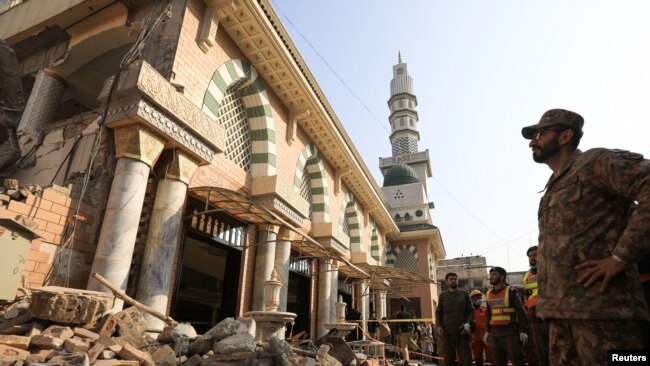ISLAMABAD, PAKISTAN — A top State Department official said the United States was prepared to work with Pakistan as the country assessed the renewed threat of terrorism. However, the official would not say whether Washington would support any Pakistani action against terrorist hideouts in Afghanistan.
Counselor Derek Chollet, one of the highest-ranking officials at the State Department, was in Islamabad on Thursday. During the visit, which was originally expected to last two days, Chollet met Pakistan’s army chief, General Asim Munir, and the country’s foreign secretary.
Chollet’s second visit in five months came as Pakistan faces near daily deadly terror attacks. A massive blast at a mosque in Pakistan’s northwestern city of Peshawar last month killed more than 100 people, mostly police personnel.
Calling that a “significant” attack, Chollet said he was not ready to make a judgment about Pakistan’s security situation.

Instead, he said Washington was “trying to wrap its head around” how the threat had been evolving in Pakistan and was “very much following their [Pakistan’s] lead in terms of both the investigation and where that leads and ensuring that those who conducted these attacks are held accountable.”
Although an arm of the Tehreek-e-Taliban Pakistan (TTP), an ideological offshoot of the Afghan Taliban, took responsibility for the Peshawar attack, TTP’s central spokesperson denied involvement. Still, the banned militant group has been behind most of the recent terrorist activity in the country.
Islamabad accuses the Afghan Taliban of allowing the TTP to use its territory to plan attacks on Pakistan, a charge the Afghan regime rejects. TTP leadership also denies working from Afghanistan, instead claiming the group is attacking Pakistan from within.
Without naming Afghanistan, Pakistan’s National Security Council said early this year, “No country will be allowed to provide sanctuaries and facilitation to terrorists, and Pakistan reserves all rights in that respect to safeguard her people.”
Right of defense
Following the Pakistani NSC statement, U.S. State Department spokesperson Ned Price said that “Pakistan has a right to defend itself” against terrorism.
Responding to VOA, Chollet would not say what kind of Pakistani counterterrorism action, including cross-border military strikes, Washington would support.
“I’m not going to get into hypotheticals about what we would support or not. … I don’t want to say … publicly … how that [Price’s statement] would apply in hypothetical situations,” Chollet said.
Instead, he said he was talking to his Pakistani counterparts about their needs and the help Washington could provide.
Last year, Pakistan conducted military strikes against alleged terrorist hideouts in Afghanistan, while the U.S. killed al-Qaida leader Ayman al-Zawahiri in a drone strike in Kabul.
Chollet’s visit came as Pakistan and the U.S. engaged in Washington in a second round of midlevel defense talks. The first round was held in Pakistan in January 2021.
In Thursday’s weekly news briefing, Mumtaz Zahra Baloch, spokesperson for Pakistan’s Ministry of Foreign Affairs, said, “Pakistan is encouraged by the positive momentum in our relations with the United States and the engagement that is taking place both here and in Washington.”
U.S. military assistance to Pakistan, however, has been stalled since 2017, and Chollet made no announcement about a possible resumption.
As Pakistan negotiates with the International Monetary Fund to avoid defaulting on external loans and its foreign reserves plummet to dangerously low levels with inflation skyrocketing, the State Department counselor said the situation was “worrisome” for Washington.
Pakistan owes the largest chunk of its foreign loans to China, its closest ally. Chollet said that while debt owed to China was a concern around the world, the U.S. was not asking Pakistan to choose between Beijing and Washington.
“[We] talk to them about some of the perils we see in the closer relations with the PRC [People’s Republic of China] and the opportunities we think that come from closer relations with us and other like-minded countries. And frankly, they see that,” he said.
Despite Pakistan’s economic crisis, political instability and worsening security situation, Chollet noted ties with the country mattered.
“Not every ally, partner, is equal, but all of our relationships matter,” he said.
Chollet said Washington had learned “the hard way” in the past few years that there was “no problem out there that we can solve alone.”
Source : VOA


